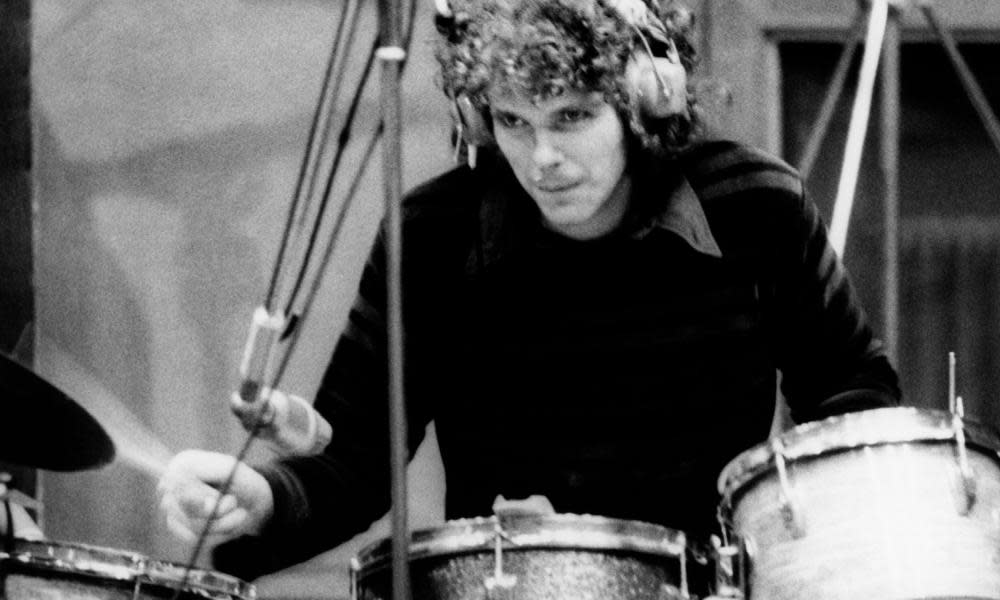Jim Gordon obituary

Amid the freewheeling rock scene of the late 1960s and early 70s, the drummer Jim Gordon was one of a group of accomplished young American session musicians who emerged from the shadows of the recording studios to become public figures in their own right, thanks to the enthusiastic patronage of such superstars as George Harrison, Eric Clapton and John Lennon.
Gordon, who has died in a US prison aged 77, began his career with the Everly Brothers in 1964. By the time he crossed the Atlantic to contribute to Harrison’s All Things Must Pass, Clapton’s Layla and Lennon’s Power to the People, he had played on many hit records in the Los Angeles studios – including the Everlys’ Love Is Strange, Mason Williams’s Classical Gas, the Byrds’ Goin’ Back, Crosby, Stills and Nash’s Marrakesh Express and the Beach Boys’ album Pet Sounds.
He would bring his skills to many other hits throughout the 70s, including Maria Muldaur’s Midnight at the Oasis, Glen Campbell’s Gentle on My Mind, Steely Dan’s Rikki Don’t Lose that Number, Carly Simon’s You’re So Vain and Joan Baez’s Diamonds and Rust.
Psychiatric problems had already slowed his career when, in 1983, it crashed to a halt. In an episode that would later be diagnosed as schizophrenia, he used a hammer and a knife to murder his 71-year-old mother, Osa Marie Gordon, later claiming that he had heard voices telling him to kill her. Handed a sentence of 16 years to life, he entered the prison system and never emerged, allegedly refusing to attend parole hearings before dying of natural causes at a medical and psychiatric facility in Vacaville, California.
Brought up in the San Fernando Valley, he was the son of Osa Marie, a nurse, and an alcoholic father. At eight he built his own drum set and at 12 was given a proper kit. Attending Grant high school, he performed with the Burbank Symphony Orchestra while evading age regulations to play at loc al clubs, and turned down a music scholarship to the University of California, Los Angeles, in order to turn professional.
Soon he was establishing himself alongside Jim Keltner as the most adept of the younger Hollywood studio drummers. Through his friendship with another session man, the pianist Leon Russell, he would become part of Joe Cocker’s Mad Dogs and Englishmen, a touring troupe put together by Russell at a week’s notice, and a similar aggregation led by the singers Delaney and Bonnie Bramlett, which was where Gordon met Clapton in 1969.
While they were recording All Things Must Pass in London the following year, Clapton invited Gordon and two fellow Americans, the pianist Bobby Whitlock and the bassist Carl Radle, to form the quartet billed, thanks to Clapton’s conflicted attitude to fame, as Derek and the Dominos. “I was in absolute awe of these people,” Clapton recalled. “I’d never felt so musically free before.”

With Duane Allman, another American, added as a second guitarist, the group recorded a Clapton song called Layla, inspired by a Sufi love poem. Several weeks later Clapton came across Gordon sitting at the studio piano, picking out a haunting melody over a descending chord progression. Thinking that it would make a striking addition to the song, he asked Gordon’s permission to use it.
Once the band had recorded it, with Gordon at the piano, it was spliced on to the original Layla as a four-minute coda and included in the band’s debut album, released at the end of 1970. Although the album was a commercial flop, the song’s inclusion in a Clapton anthology two years later led to its release as a single and subsequent worldwide chart success. Later the singer Rita Coolidge, then Gordon’s girlfriend, claimed to have played a part in writing it, although she received no credit.
Disagreements not unrelated to the band’s prodigious consumption of drugs and alcohol led to a breakup during the early stages of preparation for a second album. Gordon was soon invited to join Traffic, his arrival freeing the group’s regular drummer, Jim Capaldi, to concentrate on singing.
Returning to Los Angeles, he resumed his life in the studios with artists from Barbra Streisand to John Lee Hooker, Van Dyke Parks to the Carpenters. He played on Jackson Browne’s The Pretender and Tom Waits’s The Heart of a Saturday Night, and in 1974 he toured Europe with the singer Johnny Rivers.
But consistency and dependability are as important to a session musician as technique and versatility, and work had dried up by the time he committed matricide. Coolidge later confirmed that Gordon had assaulted her during the course of their relationship.
During his four decades of incarceration and treatment, a drum break from the cover version of the Shadows’ instrumental hit Apache, which Gordon had recorded with the Incredible Bongo Band in 1973, became a favoured sample of hip-hop artists.
Two marriages, to Jill Gordon, a dancer, and Renée Armand, a singer and songwriter, ended in divorce. He is survived by a daughter, Amy, from the first marriage.
• Jim Gordon (James Beck Gordon), drummer, born 14 July 1945; died 13 March 2023

 Yahoo News
Yahoo News 